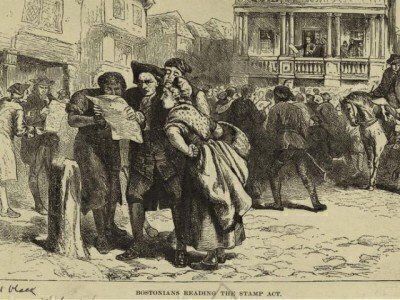On November 1, 1765, the hated Stamp Act authorized by King George III went into effect in the colonies, despite months of protests. The act would be quickly repealed, but it started a series of events that led to the American Revolution.

The British government sought ways to raise money to support a standing army in the American colonies after the French and Indian War concluded. Nearly 10,000 British troops remained stationed on American soil after the conflict ended in 1763.
In 1764, Parliament had passed the Sugar Act, which cut import taxes in half on molasses (which was used to make rum) but also contained strict measures to collect taxes that most colonists had avoided paying. There was also a draft measure circulating about a second tax that could be coming from Parliament.
The debate over the Stamp Tax in early 1765 in Parliament was contentious. On the floor of Parliament, an Irishman, John Barre, deeply opposed the proposed tax on the American colonies and questioned Parliament’s motives.
“As soon as you began to care about them, that care was exercised in sending persons to rule over them, in one department and another… sent to spy out their liberty, to misrepresent their actions and to prey upon them; men whose behavior on many occasions has caused the blood of these sons of liberty to recoil within them,” Barre said, coining the phrase that would be used back in the Colonies by a group of protesters.
The Sons of Liberty were formed in early 1765 in Boston and New York as concerns grew among colonists about more taxes and more control by the British government. On March 22, 1765, British Parliament finally passed the Stamp Act or Duties in American Colonies Act. It required colonists to pay taxes on every page of printed paper they used. The tax also included fees for playing cards, dice, and newspapers.
The reaction in the colonies was immediate. The protests were based on the legal principle that the colonial legislatures only had the power to tax residents who had representatives in those legislatures. That summer, Massachusetts called for a meeting of all the colonies – a Stamp Act Congress – to be held in New York in October 1765. Committees of Correspondence were also formed in the colonies to coordinate protests against the Stamp Act.
And on August 14, 1765, outrage boiled over in Boston. Protesters organized as the “Sons of Liberty” took to the streets in a defiant act against British rule. The Sons of Liberty met under what was known as the Liberty Tree near Boston Common. Hoisted on the tree was an effigy of Andrew Oliver, the city’s stamp tax agent. Soon, a mob of several thousand people attacked Oliver’s office and his home, and the effigy was stomped, decapitated, and burned.
News of the protests, the actions of the Stamp Congress, and the publication of Patrick Henry’s Virginia Resolves fueled anger across the colonies, and many colonies created their own versions of the Sons of Liberty.
The Sons of Liberty would eventually include Samuel Adams, Paul Revere, Benedict Arnold, Benjamin Edes, John Hancock, Patrick Henry, James Otis, Benjamin Rush, and Oliver Wolcott.
The tax did go into effect on November 1 with a general boycott underway in the Colonies against British goods. The Parliament repealed the Stamp Act the following year, facing additional pressure from British merchants who saw their sales to the Colonies plummet. But Parliament then passed the Declaratory Act, which stated its right in principle to tax the colonies as it saw fit.
The conflict with the British government continued to heat up, with the Tea Party protests of 1773, the passage of the Coercive Acts in 1774, and, finally, the outbreak of fighting in Massachusetts the following year.







